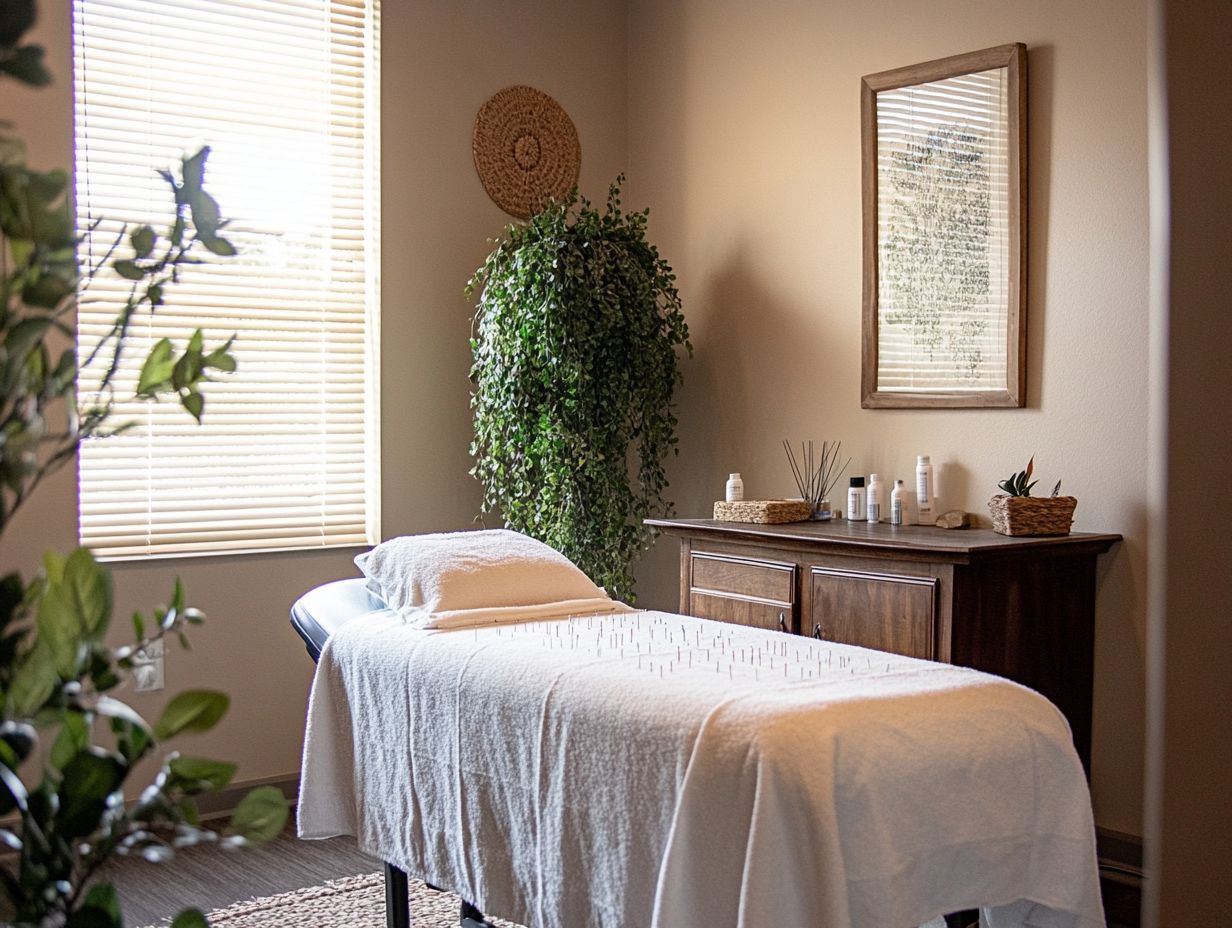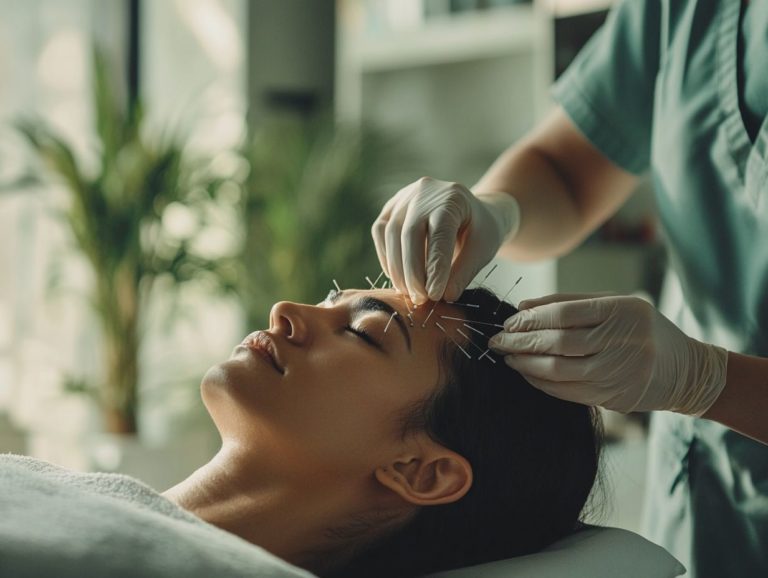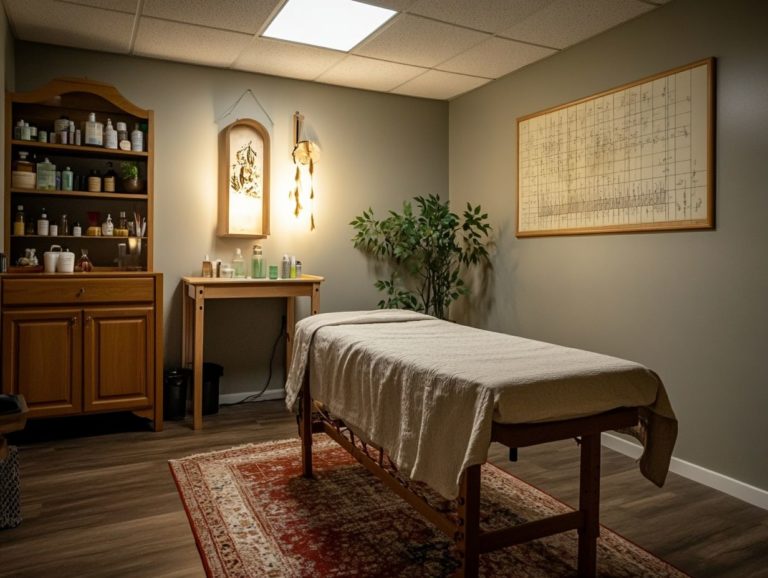Acupuncture and Mental Health: Exploring the Benefits
Acupuncture, a time-honored practice deeply embedded in Traditional Chinese Medicine, is receiving increasing attention for its promising benefits in mental health.
While it s widely recognized for its efficacy in pain management, this holistic therapy presents a distinctive approach to addressing challenges such as stress, anxiety, and mood disorders.
In this article, you will explore how acupuncture can boost your mental well-being, discover the various techniques employed, and examine the evidence that underlines its effectiveness.
Uncover how this ancient practice could be a significant complement to contemporary mental health treatments.
Contents
- Key Takeaways:
- Discover How Acupuncture Can Transform Your Mental Health
- Benefits of Acupuncture for Mental Health
- How Acupuncture is Used in Mental Health Treatment
- Safety and Effectiveness of Acupuncture for Mental Health
- Frequently Asked Questions
- How many acupuncture sessions are typically needed to see improvements in mental health?
- Are there any potential side effects of acupuncture for mental health?
- Can acupuncture be used in conjunction with other treatments for mental health?
Key Takeaways:

Acupuncture can reduce stress and anxiety, improve mood and emotional well-being, and manage symptoms of mental illness. It is used as a standalone treatment or in combination with other therapies for mental health treatment. Research shows that the role of acupuncture in managing depression is both safe and effective, but precautions should be taken before starting treatment.
Discover How Acupuncture Can Transform Your Mental Health
Acupuncture is gaining recognition for its profound impact on mental health and overall well-being. This ancient practice uses tiny needles placed at specific points on your body to help you feel better and promote balance.
As a result, many individuals experience significant improvements in mental health conditions, including depression, anxiety, PTSD, and chronic pain. Systematic reviews and research funded by the National Institutes of Health underscore acupuncture s potential to enhance emotional resilience and patient outcomes.
It offers a holistic treatment approach that elegantly combines body therapy with conventional medication, making it a compelling option for those seeking comprehensive care.
What is Acupuncture?
Acupuncture is a therapeutic practice steeped in the rich tradition of Chinese Medicine, where the gentle insertion of fine needles into specific points of your body works to restore balance and promote healing. This ancient healing art operates on the principles of Qi, the vital energy that flows through your body, and the yin-yang philosophy, which emphasizes harmony within your internal systems.
There are various forms of acupuncture you can explore, including traditional acupuncture, electro-acupuncture, and auricular acupuncture, each designed to address specific health concerns uniquely suited to you.
Historically, acupuncture served not only as a means of pain relief but also played a vital role in preventive care and holistic health. It has adapted over centuries to encompass dietary and lifestyle recommendations tailored to your needs.
In today s healthcare landscape, acupuncture has evolved beautifully, integrating seamlessly with Western medicine. You will often find it used alongside conventional therapies for issues like chronic pain, stress management, and rehabilitation, ultimately enhancing your overall experience and outcomes.
How Does it Affect Mental Health?
Acupuncture has a profound impact on mental health by engaging various brain chemicals that help modulate stress responses and enhance emotional resilience. This time-honored practice targets specific points on your body, triggering the release of endorphins, the body s natural painkillers, and neurotransmitters like serotonin and dopamine, which are essential for regulating mood.
Research indicates that individuals grappling with anxiety and depression often find significant relief through acupuncture; one study even reported a remarkable 70% improvement rate among participants.
Evidence shows that people with PTSD often see reduced symptoms after several sessions, highlighting that the balanced neurochemical activity initiated by acupuncture may foster emotional stability and recovery.
These findings truly underscore the innovative and holistic potential of acupuncture as a complementary treatment for a variety of mental health conditions.
Benefits of Acupuncture for Mental Health
Don’t miss out on the incredible benefits of acupuncture for your mental health! Acupuncture provides a wealth of advantages, from alleviating stress to enhancing mood and effectively managing symptoms linked to a variety of mental health conditions. To learn more about how this practice can benefit you, check out how acupuncture supports overall wellbeing.
Embracing this holistic approach can significantly enrich your overall well-being.
Ready to explore how acupuncture can change your life? Discover more now!
Reducing Stress and Anxiety

Acupuncture is a natural way to significantly lower your stress and anxiety levels. This ancient practice can help not just with immediate feelings of anxiety but also build long-term emotional strength.
Research in the Journal of Alternative and Complementary Medicine found that participants receiving regular acupuncture saw a 50% reduction in anxiety symptoms over eight weeks.
Many testimonials highlight the holistic benefits of acupuncture. People report reclaiming control over their emotional health, leading to better stress management and overall well-being.
With strong evidence supporting its benefits, acupuncture is becoming an essential ally in achieving mental peace.
Improving Mood and Emotional Well-being
Acupuncture is essential for enhancing your mood and emotional well-being, especially if you’re dealing with depression or PTSD.
Research shows that this technique stimulates specific points on the body, triggering the release of chemicals in the brain that help regulate mood, such as serotonin and endorphins.
Studies indicate significant improvements in emotional health across various demographics, from veterans facing trauma to older adults managing anxiety.
By encouraging relaxation and reducing stress hormones, acupuncture alleviates symptoms of mental health disorders and fosters a profound sense of balance and calm.
As more individuals seek holistic paths toward emotional resilience, the benefits of acupuncture are increasingly acknowledged in both clinical and community environments.
Managing Symptoms of Mental Illness
Acupuncture serves as an effective method for managing symptoms associated with various mental illnesses, including anxiety disorders and chronic pain.
This traditional Chinese medicine technique helps stabilize emotional responses and reduce stress levels, making it a valuable adjunct therapy for those grappling with these conditions.
Numerous systematic reviews and randomized controlled trials (RCTs) have shown that acupuncture can significantly alleviate symptoms such as insomnia, agitation, and fatigue.
Many individuals report noticeable improvements in mood and a greater sense of calm following treatment, contributing to a better quality of life.
By targeting specific pressure points, acupuncture not only supports mental health but also fosters a holistic approach to healing both the mind and body.
How Acupuncture is Used in Mental Health Treatment
Acupuncture is becoming an essential part of mental health treatment plans. It serves as a complementary therapy that blends seamlessly with traditional approaches.
You ll often find it used alongside conventional treatments, enhancing overall well-being and offering a holistic path to healing.
Types of Acupuncture Used
Various acupuncture techniques are utilized in mental health treatment, each carefully tailored to meet specific conditions and patient needs.
Traditional acupuncture aims to restore balance within the body by inserting fine needles at precise points, effectively alleviating symptoms of anxiety and depression.
For those dealing with chronic stress, electro-acupuncture elevates this practice by introducing a mild electrical current to the needles, amplifying its therapeutic effects.
Meanwhile, auricular acupuncture focuses on specific points in the ear, making it a valuable tool for managing cravings and aiding recovery in addiction treatment.
With each method offering distinct advantages, practitioners can customize their approach to align perfectly with individual circumstances and treatment goals.
Combination with Other Therapies

Imagine combining acupuncture with other therapies to boost your mental health. Combinar la acupuntura con otras modalidades terap uticas puede mejorar significativamente los resultados de tu tratamiento en el cuidado de la salud mental. Este enfoque integrado aprovecha las fortalezas de cada terapia, lo que puede llevar a una mayor satisfacci n y reducci n de s ntomas.
La investigaci n indica que cuando incorporas la acupuntura junto con la psicoterapia, puedes experimentar una mayor resiliencia emocional y una notable disminuci n en los niveles de ansiedad.
La pr ctica cl nica muestra que las personas que est n bajo medicaci n a menudo informan menos efectos secundarios y una mejora general en el bienestar cuando se incluye la acupuntura en su plan de tratamiento. Esta sinergia entre varias estrategias fomenta un entorno de curaci n hol stica, subrayando la importancia de abordar m ltiples facetas del cuidado de la salud mental para una recuperaci n integral.
Safety and Effectiveness of Acupuncture for Mental Health
The safety and effectiveness of acupuncture for mental health have been explored through comprehensive research and systematic reviews.
This research shows a solid foundation for understanding its potential benefits in addressing mental health concerns.
Evidence-based Research
Evidence-based research substantiates the effectiveness of acupuncture in mental health treatment, with numerous systematic reviews validating how acupuncture can benefit your overall health.
These reviews, curated from esteemed repositories such as the National Library of Medicine and Cochrane, underscore how acupuncture can significantly alleviate symptoms of anxiety, depression, and stress.
The findings reveal that this treatment not only enhances emotional well-being but may also lead to body changes that foster relaxation and restore balance within the nervous system.
Many participants say they notice marked improvements in mood and overall mental resilience following acupuncture sessions.
As more professionals embrace this holistic approach in their practices, it becomes clear that acupuncture holds great potential as a valuable complementary therapy for those seeking relief from mental health challenges, including its effects on skin health.
Potential Risks and Precautions
While acupuncture is typically regarded as safe, it s vital for you to recognize potential risks and take the necessary precautions. Understanding the details of this traditional Chinese medicine is essential if you’re considering treatment.
Ensure that your practitioner is properly trained and licensed to minimize risks such as infection, organ puncture, or adverse reactions to needles. It s wise to ask about a practitioner’s qualifications and experience before starting your treatment.
According to FDA guidelines, practitioners should use sterile, single-use needles to prioritize your safety. By following these recommendations, you not only enhance the effectiveness of the treatment but also cultivate a trustworthy environment for your journey towards relief through acupuncture.
Frequently Asked Questions
Here are some common questions about acupuncture and its role in mental health.
What is acupuncture and how does it relate to mental health?

Acupuncture is a form of traditional Chinese medicine that involves the insertion of thin needles into specific points on the body to stimulate energy flow. It has been found to be beneficial for mental health as it can help regulate the body’s natural balance and alleviate symptoms of anxiety, depression, and stress.
What are some potential benefits of acupuncture for mental health?
Acupuncture can help reduce symptoms of anxiety, depression, and stress by promoting relaxation and improving overall well-being. It can also aid in reducing insomnia, improving mood, and increasing energy levels.
Is there any scientific evidence to support the benefits of acupuncture for mental health?
Yes, there is growing research supporting the effectiveness of acupuncture for mental health. Studies have shown that acupuncture can help regulate chemicals in the brain that affect mood, leading to an improvement in symptoms of anxiety and depression.
Consider trying acupuncture as part of your mental health journey!
How many acupuncture sessions are typically needed to see improvements in mental health?
The number of acupuncture sessions needed can vary based on your health issue and how well you respond to the treatment. You might feel fantastic after just a few sessions, while others may need more frequent visits over a longer time.
Are there any potential side effects of acupuncture for mental health?
Acupuncture is generally safe when done by a trained and licensed practitioner. Some people might feel mild bruising or soreness where the needles go in, but these feelings usually pass quickly.
Can acupuncture be used in conjunction with other treatments for mental health?
Yes! Acupuncture can complement other therapies, such as medication and counseling. It s important to talk to your healthcare provider before starting any new treatments.






